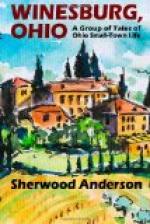In his own somber way, Anderson has here touched upon one of the great themes of American literature, especially Midwestern literature, in the late nineteenth and early twentieth centuries: the struggle for speech as it entails a search for the self. Perhaps the central Winesburg story, tracing the basic movements of the book, is “Paper Pills,” in which the old Doctor Reefy sits “in his empty office close by a window that was covered with cobwebs,” writes down some thoughts on slips of paper ("pyramids of truth,” he calls them) and then stuffs them into his pockets where they “become round hard balls” soon to be discarded. What Dr. Reefy’s “truths” may be we never know; Anderson simply persuades us that to this lonely old man they are utterly precious and thereby incommunicable, forming a kind of blurred moral signature.
After a time the attentive reader will notice in these stories a recurrent pattern of theme and incident: the grotesques, gathering up a little courage, venture out into the streets of Winesburg, often in the dark, there to establish some initiatory relationship with George Willard, the young reporter who hasn’t yet lived long enough to become a grotesque. Hesitantly, fearfully, or with a sputtering incoherent rage, they approach him, pleading that he listen to their stories in the hope that perhaps they can find some sort of renewal in his youthful voice. Upon this sensitive and fragile boy they pour out their desires and frustrations. Dr. Parcival hopes that George Willard “will write the book I may never get written,” and for Enoch Robinson, the boy represents “the youthful sadness, young man’s sadness, the sadness of a growing boy in a village at the year’s end [which may open] the lips of the old man.”
What the grotesques really need is each other, but their estrangement is so extreme they cannot establish direct ties—they can only hope for connection through George Willard. The burden this places on the boy is more than he can bear. He listens to them attentively, he is sympathetic to their complaints, but finally he is too absorbed in his own dreams. The grotesques turn to him because he seems “different”—younger, more open, not yet hardened—but it is precisely this “difference” that keeps him from responding as warmly as they want. It is hardly the boy’s fault; it is simply in the nature of things. For George Willard, the grotesques form a moment in his education; for the grotesques, their encounters with George Willard come to seem like a stamp of hopelessness.
The prose Anderson employs in telling these stories may seem at first glance to be simple: short sentences, a sparse vocabulary, uncomplicated syntax. In actuality, Anderson developed an artful style in which, following Mark Twain and preceding Ernest Hemingway, he tried to use American speech as the base of a tensed rhythmic prose that has an economy and a shapeliness seldom found in ordinary speech or even oral narration. What Anderson employs here is a stylized version of the American language, sometimes rising to quite formal rhetorical patterns and sometimes sinking to a self-conscious mannerism. But at its best, Anderson’s prose style in Winesburg, Ohio is a supple instrument, yielding that “low fine music” which he admired so much in the stories of Turgenev.




